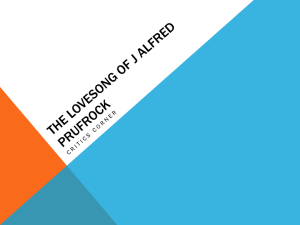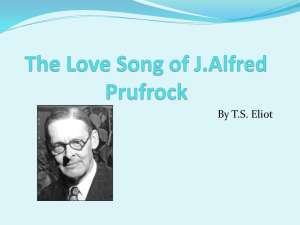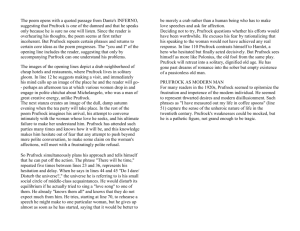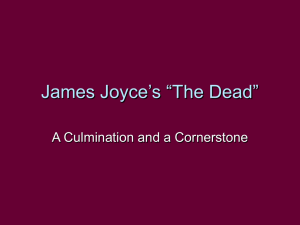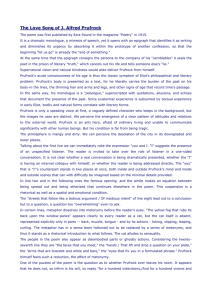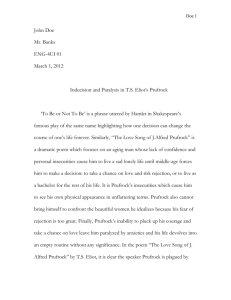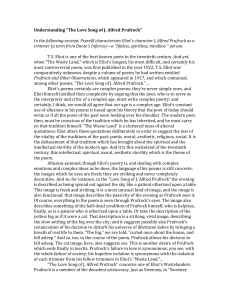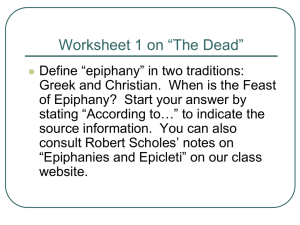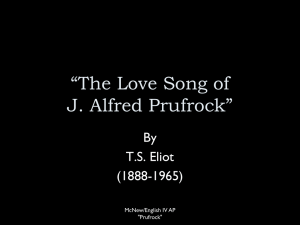File
advertisement
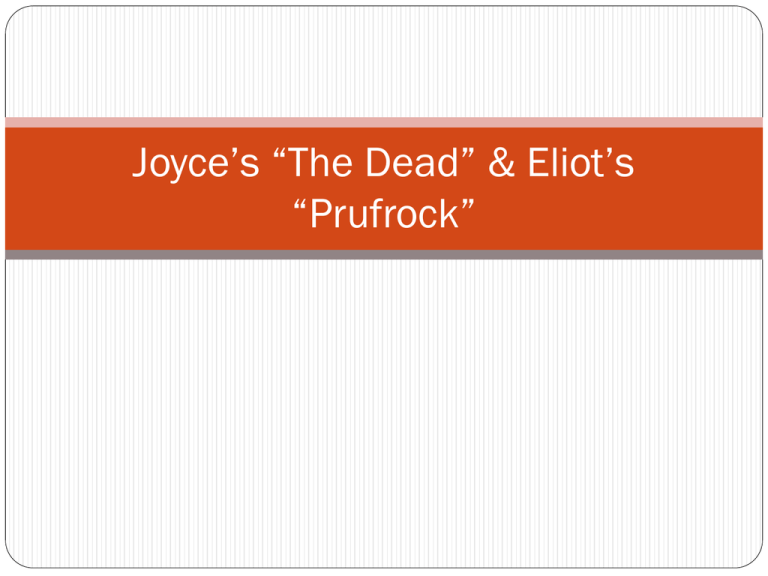
Joyce’s “The Dead” & Eliot’s “Prufrock” Comparative Analysis A Comparative Analysis in Literature refers to a comparison of two different texts on the basis of plot, character, theme, etc. Examining two texts side by side is an important skill; it develops critical thinking skills on all levels. In this sample comparative analysis, we will look at James Joyce’s 1914 novella The Dead and T. S. Eliot’s 1915 poem “The Lovesong of J. Alfred Prufrock.” When writing a comparative analysis, you would never set up your thesis as such: I am going to compare and contrast the similarities and differences between… Instead, you might say: Joyce and Eliot use their respective texts to reveal the insecurities of their protagonists, thus presenting readers with an examination of “the Modern man” faced with reconciling his past, his present, and eventually, his own mortality. Plot “On the surface, "The Love Song of J. Alfred Prufrock" relays the thoughts of a sexually frustrated middle-aged man who wants to say something but is afraid to do so, and ultimately does not.” The poem describes Prufrock contemplating different social settings but never being comfortable in his own skin. Joyce’s “The Dead” takes place at the annual dinner party/dance hosted by the Morkan sisters. Their nephew, Gabriel Conroy, has an “epiphany” after realizing that he knows little of his wife’s past. Similar to “Prufrock,” much of “The Dead” concentrates on Gabriel’s ‘discomfort’ in his own skin. J. Alfred Prufrock & Gabriel Conroy Insecure Socially Awkward Uncomfortable Coping Mechanisms Pathetic On Gabriel… Examples: Gabriel makes a rude joke at the expense of the maid Lily; to cope, he fidgets, adjusts his clothes, and gives her a tip. Gabriel becomes uneasy when his wife makes a joke about him (galoshes). Gabriel is afraid of being “pretentious” when he addresses people yet openly admits that his vocabulary is “above” the others. Supportive Quotes Quote: “He would only make himself ridiculous by quoting poetry to them which they could not understand” (180). “He would fail them just as he had failed with the girl in the pantry. He had taken up a wrong tone. His whole speech was a mistake from first to last, an utter failure” (180). “Gabriel laughed nervously and patted his tie reassuringly…” (181). On Prufrock… “No! I am not Prince Hamlet, nor was meant to be; Am an attendant lord, one that will do To swell a progress, start a scene or two, Advise the prince; no doubt, an easy tool, Deferential, glad to be of use, Politic, cautious, and meticulous; Full of high sentence, but a bit obtuse; At times, indeed, almost ridiculous—Almost, at times, the Fool. I grow old … I grow old … I shall wear the bottoms of my trousers rolled” (Lines 111120). Prufrock & Self-Esteem My morning coat, my collar mounting firmly to the chin, My necktie rich and modest, but asserted by a simple pin— (They will say: “But how his arms and legs are thin!”) Though I have seen my head (grown slightly bald) brought in upon a platter, I am no prophet—and here’s no great matter; I have seen the moment of my greatness flicker, And I have seen the eternal Footman hold my coat, and snicker, And in short, I was afraid. “Death in Prufrock” The first of these comes in the epigraph from Dante’s Inferno: S’io dredesse che mia reposta fosse A persona che mai tornasse al mondo, Questa fiamma staria senza piu scosse. Ma perciocche giammai di questo fondo Non torno vivo alcun, s’I’odo il vero, Senza tema d’infamia ti rispondo. (27.61-66) This is roughly translated to mean that if the speaker knew his words would be taken outside of Hades, he would not have told his story. Since he knows that Dante will not leave, he relates his secrets--known only to the dead. Death in “Prufrock” “I have heard the mermaids singing, each to each. I do not think that they will sing to me. I have seen them riding seaward on the waves Combing the white hair of the waves blown back When the wind blows the water white and black.We have lingered in the chambers of the sea By sea-girls wreathed with seaweed red and brown 130 Till human voices wake us, and we drown” (Lines 124-131). The poem ends with the contemplation of death. Throughout the poem, the protagonist is “drowning” in thought. The last lines also echo the “spiritual void” experienced in the 20th century. “The Dead” In Gabriel’s speech, he says, “and if [the old days] are gone beyond recall let us hope, at least, that we shall still speak of them with pride and affection, still cherish in our hearts the memory of those dead and gone great ones whose fame the world will not let die” (195)– he is speaking in regards to great musicians at this point. He continues, “there are always gatherings such as this sadder thoughts that will recur to our minds: thoughts of the path, of youth, of changes. Our path through life is strewn with many such sad memories… Therefore, I will not linger in the past” (195). The story ends as his wife reveals to him what has been on her mind that evening: She was in love with a boy named Michael Furey but had to leave to go to the convent. Before she left, although he was ill, he travelled to see her, proclaiming that he did not wish to live without her. He died within a week after she left. The last image is Gabriel imagining the snow covering the graveyard– the same snow “falls upon the living and the dead” (207). The Protagonists Contemplate Prufrock contemplates throughout the poem: Should he put himself out there? Should he shed his insecurity and take himself out of his comfort zone? Should he take a chance on love, even if the odds are not in his favor. Gabriel is forced to contemplate whether it is better to die young– with emotion and passion intact. He also contemplates the idea of being remembered after death. Throughout the story, in fact, contemplation is a theme: Gretta falls into deep contemplation after hearing the song that reminds her of her lost love; Gabriel contemplates his feelings for Gretta as he watches her from afar, then his current relationship with her after her revelation. Gabriel is often seen leaving the crowd, staring out of the window, in contemplation. Themes * One theme presented is that a full life is achieved through the experience of passion. “The Dead”: “Reflecting on his own controlled, passionless life, he realizes that life is short, and those who leave the world like Michael Furey, with great passion, in fact live more fully than people like himself.” Gabriel realizes that he has never experienced the type of passion Gretta describes in her story about Michael Furey. In “Prufrock,” readers get the sense that his fear will prevent him from ever truly “knowing” those “braceleted arms” or “forcing a moment to its crisis.” “In short, [he] was afraid.” Whether due to fear or not, the message is the same: Living with passion is optimal, and a person living without it is either “better off dead” (Gabriel) or perhaps dead already (Prufrock). Love/Nostalgia Another theme in both is the power of nostalgia. We are confronted with “time.” “Prufrock” thinks there “will be time” for toast, tea, revisions, decisions… and ultimately, for love. In “The Dead,” a lot of attention is given to the glory days of the aunts– days that are past. The people at the party lament for those that are no longer there. In the same sense, Prufrock reminisces about all of the women that he has encountered (or wanted to encounter), the parties, the teas, etc. Gabriel realizes that he may not have experienced love: “He had never felt like that himself towards any woman but he knew that such a feeling must be love” (206). The real power of nostalgia is revealed in the end of “The Dead,” as Gabriel learns just how strong the pull of the past is; the song triggers memories in Gretta that eventually bring her to tears. This leaves Gabriel changed, left to explore “his shifting views on himself, his wife, the past, the living and the dead.” The Burden of Aging “Eliot uses imagery which is indicative of Prufrock's character, representing aging and decay. For example, "When the evening is spread out against the sky / Like a patient etherized upon a table" (lines 2-3), the "sawdust restaurants" and "cheap hotels," the yellow fog, and the afternoon "Asleep...tired... or it malingers" (line 77), are reminiscent of languor and decay, while Prufrock's various concerns about his hair and teeth, as well as the mermaids "Combing the white hair of the waves blown back / When the wind blows the water white and black," show his concern over aging.” The Burden of Aging Likewise in “The Dead,” Gabriel finds himself older and unable to capture the passion of the earlier days of his relationship with Gretta. Quotes: “He longed to recall to her those moments, to make her forget the years of their dull existence together and remember only their moments of ecstasy” (201). “He did not like to say even to himself that her [Gretta’s] face was no longer beautiful but he knew that it was no longer the face for which Michael Furey had braved death” (206). One by one they were all becoming shades. Better pass boldly into that other world, in the full glory of some passion, than fade and wither dismally with age” (206). This is mirrored in the story with the aunts; Kate says, “I am only a stupid old woman and I wouldn’t presume to do such a thing” (190). Never Tell Prufrock’s Epigraph: “In context, the epigraph refers to a meeting between Dante and Guido da Montefeltro, who was condemned to the eighth circle of Hell for providing counsel to Pope BonifaceVIII, who wished to use Guido's advice for a nefarious undertaking.This encounter follows Dante's meeting with Ulysses, who himself is also condemned to the circle of the Fraudulent. According to Ron Banerjee, the epigraph serves to cast ironic light on Prufrock's intent. Like Guido, Prufrock had intended his story never be told, and so by quoting Guido, Eliot reveals his view of Prufrock's love song” Likewise, Gretta’s relationship with Michael Furey has long been a secret, one that she probably never intended to tell. Modernity Both can also be seen as commentaries on Modernity. ”In his speech, Gabriel claims to lament the present age in which hospitality like that of the Morkan family is undervalued, but at the same time he insists that people must not linger on the past, but embrace the present. Gabriel’s words betray him, and he ultimately encourages a tribute to the past, the past of hospitality, that lives on in the present party. His later thoughts reveal this attachment to the past when he envisions snow as “general all over Ireland.” In every corner of the country, snow touches both the dead and the living, uniting them in frozen paralysis.” “But we are living in a skeptical and… a thought-tormented age: and sometimes I fear that this new generation, educated or hypereducated as it is, will lack those qualities of humanity, of hospitality, of kindly humour which belonged to an older day” (195). Modernity “Many believe that the poem is a criticism of Edwardian (The Edwardian era or Edwardian period in the United Kingdom is the period covering the reign of King EdwardVII, 1901 to 1910) society and Prufrock's dilemma represents the inability to live a meaningful existence in the modern world.McCoy and Harlan wrote, "For many readers in the 1920s, Prufrock seemed to epitomize the frustration and impotence of the modern individual. He seemed to represent thwarted desires and modern disillusionment.” Prufrock represents the order, angst, decay, hopelessness, dread, loss, etc. of the Modern Era.
